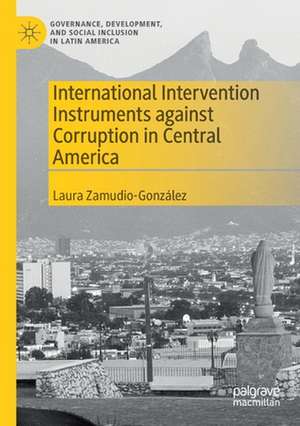International Intervention Instruments against Corruption in Central America: Governance, Development, and Social Inclusion in Latin America
Autor Laura Zamudio-Gonzálezen Limba Engleză Paperback – 2 apr 2021
| Toate formatele și edițiile | Preț | Express |
|---|---|---|
| Paperback (1) | 372.76 lei 43-57 zile | |
| Springer International Publishing – 2 apr 2021 | 372.76 lei 43-57 zile | |
| Hardback (1) | 378.80 lei 43-57 zile | |
| Springer International Publishing – 2 apr 2020 | 378.80 lei 43-57 zile |
Preț: 372.76 lei
Nou
Puncte Express: 559
Preț estimativ în valută:
71.36€ • 73.39$ • 59.20£
71.36€ • 73.39$ • 59.20£
Carte tipărită la comandă
Livrare economică 17 februarie-03 martie
Preluare comenzi: 021 569.72.76
Specificații
ISBN-13: 9783030408800
ISBN-10: 3030408809
Pagini: 142
Ilustrații: XIX, 142 p.
Dimensiuni: 148 x 210 mm
Greutate: 0.2 kg
Ediția:1st ed. 2020
Editura: Springer International Publishing
Colecția Palgrave Pivot
Seria Governance, Development, and Social Inclusion in Latin America
Locul publicării:Cham, Switzerland
ISBN-10: 3030408809
Pagini: 142
Ilustrații: XIX, 142 p.
Dimensiuni: 148 x 210 mm
Greutate: 0.2 kg
Ediția:1st ed. 2020
Editura: Springer International Publishing
Colecția Palgrave Pivot
Seria Governance, Development, and Social Inclusion in Latin America
Locul publicării:Cham, Switzerland
Cuprins
1. Introduction: Corruption and State Capture: Emerging Topics in the International Security Agenda.- 2. Hybrid Anticorruption Agencies.- 3. Theoretical Framework: HACAs as Autonomous Actors.- 4. The International Commission against Impunity in Guatemala (CICIG).- 5. The Support Mission against Corruption and Impunity in Honduras (MACCIH).- 6. CICIG and MACCIH: Two Models of Hybrid Anticorruption Agencies.
Notă biografică
Laura Zamudio-González is Associate Professor of International Studies at Universidad Iberoamericana, Mexico.
Textul de pe ultima copertă
This book analyzes the innovative international intervention instruments against corruption in Central America called Hybrid Anticorruption Agencies or HACAS. The author aims to disclose and explain the decision of the United Nations and the Organization of American States to promote, separately but with a similar rationale, a new strategic approach to fighting corruption through the creation of two HACAS. Specifically, the book examines the International Commission Against Impunity in Guatemala (CICIG) and the Mission to Support the Fight against Corruption and Impunity in Honduras (MACCIH). The CICIG and the MACCIH represent unique cases of anti-corruption hybrid commissions because they combine resources, participants and/or national and international institutions which, in a coherent and integrated manner, strengthen the investigation, prosecution, and punishment of corrupt and criminal acts. The book also studies the HACAS as international instruments not free from risks and limitations.
Laura Zamudio-González is Associate Professor of International Studies at Universidad Iberoamericana, Mexico. Caracteristici
Analyzes international intervention instruments against corruption in Central America Aims to explain the decision of the UN and the Organization of American States to promote a new strategic approach to fighting corruption through the creation of international hybrid commissions Offers an assessment on the organizational decision, the actors and the internal conditions that prompted a new strategic approach















